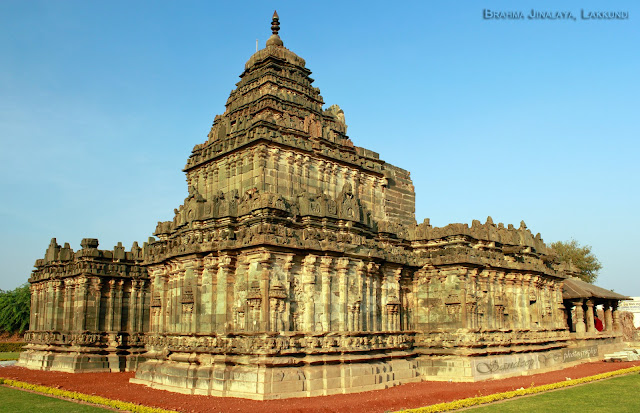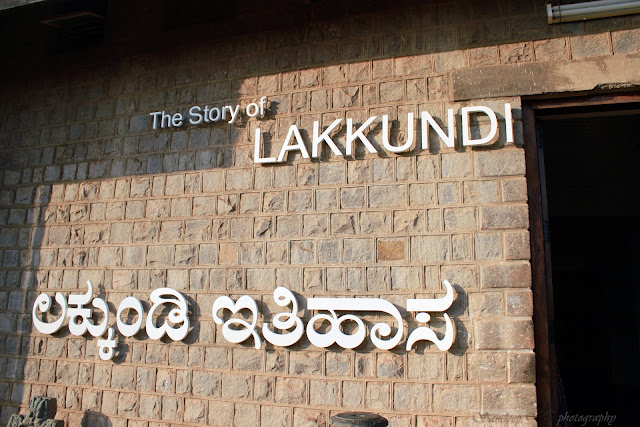Lakkundi - Brahma Jinalaya Temple:
Next in the itinerary were the Brahma Jinalaya and the museum, which was just about 500m from the Kashivishwanatha temple. After spending enough time at Kashivishwanatha temple, we then moved towards the Museum, where the Brahma Jinalaya temple is also located.
 |
| first look of Brahma Jinalaya Temple |
Archeological Museum: The Museum is worth a visit. Unlike Kashivishwanatha temple there is a ticketing counter here where one has to take tickets at the museum, it was 10Rs per adult and 25Rs for camera. The museum is undertaken from the Archeological survey of India and is pretty well maintained too. It has a lot of exquisite monuments and here again photography was banned.
Brahma Jinalaya/ Jainalaya (Basadi): behind the museum is the Jain basadi which is perhaps the largest and oldest temple at Lakkundi today. An inscription found here reveals that the temple was built in 1007 AD by queen Attimabbe or Attiyabbe, wife of chief Nagadeva, during the reign of the Kalyani Chalukya ruler Irivabedanga Satyashraya. This temple is a good example of the Karnataka Dravida style of temple construction, a style that evolved during the Kalyani Chalukya period.
The temple is arranged along an east-west axis, and has a sanctum, a vestibule, a walled hall, a large open pillared hall, and an entrance gateway. But an unusual feature here is the second functional smaller sanctum over the ground floor sanctum. The temple’s three-storied superstructure is crowned by a square cupola and a pot finial. The front open pillared hall with its varieties of beautiful pillars and sloping roof may be a later addition. Exterior decoration is restricted to architectural motifs and small figures of Tirthankaras, Yakshas and Yakshis.
 |
| Side view of the sloping roof |
The square navaranga has in the center four Chalukyan pillars of great beauty. The base of the pillars has low relief sculptures of dancers, musicians, mother and a child etc.
 |
| sculptures on the base of the pillars |
The doorway is finely carved with creeper and has Gajalakshmi on the lintel.
 |
| Lintel |
 |
| five sections of the door-frame of the grabhagriha |
 |
| Close up of the door frame carvings |
The open mukhamandapa has 28 fine pillars.
 |
| Inside the open mukhamandapa with each of the pillar design being unique |
The temple is dedicated to Mahavira, the most revered saint of Jainism. The square garbagudi holds the idol of Vardhamana Mahavira tirthankara in a fine black stone. He is flanked on both sides by Chamara bearers and there is a triple umbrella above.
 |
| Statue of Mahavira, with golden statue in the front |
 |
| Statue of Mahavira |
There was hardly any light inside the garbhagriha, i took the above pic with long exposure and the one above it with flash.
 |
| Sculptures on the roof top |
 |
| Sculptures on the walls of the temple |
More than all, the cylindrical sculptor of Chaturmukha Brahma located on the right side of the temple hall, attracts the pilgrims and the art lovers to the heart's content. This was one of the most beautiful sculptures I've ever seen. There were already a lot of damages on the statue so i feel this should rather be preserved inside the museum.
 |
| Statue of Brahma - termed as the creator of the universe with 4 heads |
Here i leave it with few more snaps of the temple,
 |
| Front view of the Brahma Jinalaya temple |
 |
| Side view of the Brahma Jinalaya temple |
 |
| Side view of the Brahma Jinalaya temple |
 |
| View from one corner of the temple |
 |
| The two storey garbhagriha shikara showing of its height |
 |
| Monkeys at Lakkundi Brahma Jinalaya Temple |
 |
| Rear view of the temple |
 |
| Rear view on the other side |
 |
| had to mention in this blog, this was another temple just beside the Museum which is encroached by the locals, hope government take back these ancient temples under the control of ASI |
Recall, one of the most popular song in Kannada film, "Anisuthide yaako endu" from movie "Mungaaru Male" was shot here.
It was by late afternoon when we finished seeing this temple and felt have to leave to reach Gadag before dark, so our plan to visit Manikeshwara temple was dropped thought shall see it in my next visit. Our auto was waiting and we went back to the bus stand and caught our bus to Gadag from there. As said by most of the visitors of Lakkundi, it never disappoints you, so it was definitely worth the visit and my time. We reached Gadag in the early evening hours and again felt the Trikuteshwara temple over here would be closed by that time and hence decided that will also go in my next visit.
Hope I visit Manikeshwara temple of Lakkundi, Trikuteshwara temple of Gadag and temples of Dambal and Lakshmeshwar in my next visit.
I leave here some of the information about Lakkundi,
Information About Lakkundi:
Distances from Lakkundi bus stand to various temples:
Manikeshwara Temple: 230m
Kashivishwanatha, Suryanarayana and Nanneshwara Temple: 900m
Brahma Jinalaya and Museum: 900m
Distance from Museum to Kashivishwanatha temple: 500m
How to reach: Lakkundi is well connected by government buses from Gadag and Koppal & can be reached by road easily.
Nearest airport: Hubli, Belgaum. Nearest International airport is Bangalore.
Nearest railway station: Gadag
Camera Used: Canon 550D with 18-55mm lens
Hotels & Restaurants: there are no proper hotels at Lakkundi, so one have to stay at Gadag.


























Very good article, well drafted and executed with well executed photographs. Will surely go through your other articles.
ReplyDelete-Saurabh
puratattva.in
Thanks :-) Glad you liked them
ReplyDelete